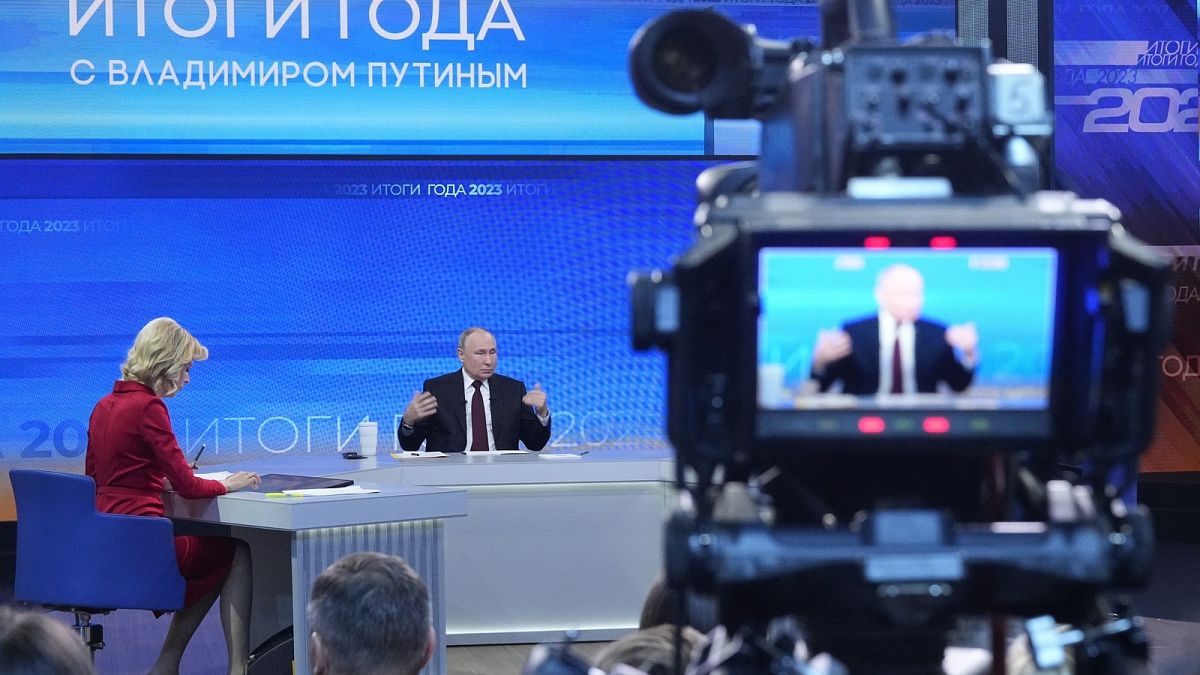European Union bans four Russian propaganda media outlets

The outlets include Voice of Europe, which was foiled as a Russian influence operation by Czech secret services in March.
The European Union has announced a ban on four media outlets accused of spreading pro-Kremlin propaganda and “destabilising” Ukraine’s neighbouring countries.
The four blacklisted outlets – Voice of Europe, RIA Novosti, Izvestia and Rossiyskaya Gazeta – are “under the permanent direct or indirect control” of Russia and have been “instrumental” in fostering support for its illegal invasion of Ukraine, the European Council said in a statement on Friday.
“The Russian Federation has engaged in a systematic, international campaign of media and information manipulation (…) to justify and support its full-scale aggression against Ukraine, and to enhance its strategy of destabilisation of its neighbouring countries, and of the EU and its member states,” the statement reads.
It also added that, “In line with the Charter of Fundamental Rights, the measures agreed will not prevent the targeted media outlets and their staff from carrying out activities in the EU other than broadcasting, e.g. research and interviews”.
The decision was anticipated by the bloc’s commissioner for values and transparency, Věra Jourová, on Wednesday when EU ambassadors greenlighted the move despite Russia’s Foreign Ministry spokeswoman Maria Zakharova warning that Moscow would retaliate against Western correspondents in Moscow.
Jourová also vowed to ban Russian funding of media outlets, NGOs and political parties in the EU.
It comes just three weeks before some 370 million voters are summoned to the polls in European elections, a vote feared to be vulnerable to Russian-backed disinformation campaigns.
The bloc is on high alert for online Russian disinformation campaigns aimed at undermining the integrity of the vote, with officials concerned the EU is deeply unprepared for new forms of foreign interference.
EU-listed media in the crosshairs
Three of the targeted outlets, RIA Novosti, Izvestia and Rossiyskaya Gazeta, are all partly owned or controlled by the Russian state.
But Voice of Europe is a Dutch-listed company with its official headquarters in a small village in the province of North Brabant. The outlet is at the heart of an ongoing sprawling investigation into allegations lawmakers across Europe were paid to peddle the Kremlin’s propaganda.
The news company claimed to provide “uncensored news from Europe and the world” and as recently as this March held one-on-one interviews and debates with sitting MEPs broadcasted from the European Parliament in Brussels and in Strasbourg.
In late March, Czech authorities announced it had busted a Russian influence operation conducted through Voice of Europe, alleging financial transactions had been made to elected officials in the European Parliament and in national parliaments.
According to Czech media citing officials from intelligence services, the allegations involve politicians from Germany, France, Poland, Belgium, the Netherlands and Hungary.
On Thursday, German police opened an investigation into EU election hopeful Petr Bystron of the far-right Alternative for Germany (AfD) party, on allegations of receiving up to €20,000 from individuals linked to Russian President Vladimir Putin to spread Kremlin propaganda.
Czech Prime Minister Petr Fiala said last month that the uncovered operation aimed to destabilise the whole of Europe, and revealed other European countries had instigated investigations as the result of Czech efforts.
Belgium has confirmed it has opened a judicial investigation given that members of the European Parliament, whose headquarters is in the Belgian capital of Brussels, are under suspicion.
Related
Zelenskyy reiterates call for air truce after huge Russian attack…
We need Russia to stop attacks, Zelenskyy says, backing calls for truce in air, at seaUkrainian president Volodymyr Zelenskyy has responded to overnight attacks
Europe scrambles to rearm as Trump threatens security guarantees and…
CNN — European leaders have vowed to rearm the continent at historic emergency talks h
Russia launches ‘massive’ attack on Ukraine after Europe rushes to…
Ukraine's energy and gas infrastructure came "under massive missile and drone shelling" by Russia on Friday, a Ukrainian minister said."The energy and gas infra
American severance may be averted, but Europe’s leaders must fear…
With a mixture of regret, laced with incredulity, European leaders gathered in Brussels to marshal their forces for a power struggle not with Russia, but with t












